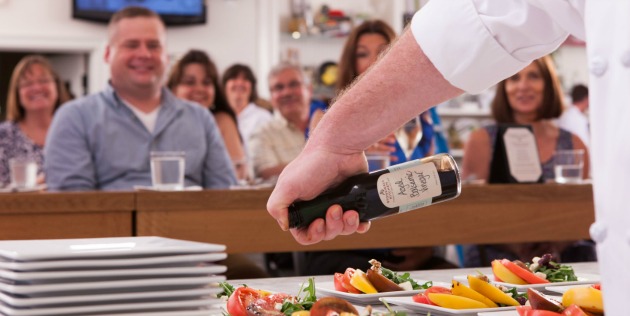Twenty-five years ago, Jonathan King and Jim Stott set out to sell their homemade jams and jellies at the local farmer's market. But to sell at the market, they needed a license, and their little enterprise didn't even have a name!
Don't miss a MarketingProfs podcast, subscribe to our free newsletter!
With just 15 minutes to name their new business venture, Jonathan King looked out the window for inspiration and saw a stone wall. "Stonewall Kitchen" was born.
The fledgling businessmen's jams and jellies were a hit at the market, with handwritten labels adding to the homemade appeal of the product. (The labels also added some flexibility to change a product's name or description if things didn't turn out as planned, like when strawberry jam failed to set, and the duo renamed the concoction "strawberry sauce.")
You can learn the full story of Stonewall Kitchen on its website, but I'd recommend you swing by its flagship location in York, Maine, instead. You can take a tour and sample some product. (The company gives away an estimated four million samples a year in its retail stores.)
I invited Stonewall Kitchen's chief executive officer, John Stiker, to Marketing Smarts to talk about how the company has successfully grown from a two-man operation into a global company with stores in 42 countries.
Relying exclusively on in-house resources, Stonewall Kitchen masterfully builds relationships with consumers through online and offline channels. The company publishes innovative content daily (including gorgeous pictures of delectable-looking food) on its blog, "The Pantry," and keeps its social media feeds—including Instagram—constantly updated. The company also offers tours of Stonewall Kitchen's headquarters in Maine, and holds cooking classes at retail locations.
Here are just a few highlights from my conversation with John:
Embrace your mistakes: someone out there might love them (or even buy them)! (06:13): "One of the neat parts of our business is we have...10 retail stores spread throughout New England. One of the stores is our factory outlet store and, unlike a lot of manufacturers who create products for their factory outlet stores intentionally, that's where we take products that don't meet our first quality standard. In every case, they're still edible products, they're still good products, but [it's] not an uncommon occurrence where you might have jam that doesn't set.
"If you think of the texture of jam, it's got some bite to it as you put a knife through it, but sometimes jam won't set, and you'll get a runnier sauce. So we'll sell that at the factory outlet store in Rochester, New Hampshire. And we'll put a sign up at that display that explains to consumers and our guests exactly what the problem is with the imperfect [product], but as long as you know that, there's a lot of folks who will like that.... We may not make money on it, but we don't lose money."
Creating effective content is like making jam: the process requires attention to quality and consistency, so invest in your team (08:56): "Unlike any other food company or consumer packaged goods company that I've worked with, we actually have our own in-house design team that does all of the creative work.... I have an on-staff photographer and an on-staff copywriter. That's almost crazy. I've worked at much bigger companies that don't have either of those things, they simply outsource it.
"But here at Stonewall, a combination of the amount of work we have to do and looking at how much you would have to pay to outsource it, but just as importantly, the control aspect of being able to manage the quality by doing all those things ourselves is why we have all of that in-house. We do all of our Web design ourselves. We do all of our catalogs, our emails, print advertising, trade advertising. We do all of that ourselves through our team led by our really terrific director of marketing."
Every member of your team can be a source of content (10:35): "We leverage everyone we've got here. If you've been on our website, you'll notice that we leverage one of our product developers as a source of content. Michelle Cole, who's one of our senior scientists in [research and development], she's also got just a great, bubbly personality and she loves the new products she comes up with, so we'll video her, certainly with every new product launch...to introduce those products, but also to do a lot of the other new product and recipe videos along the way to generate content."
To learn more, visit StonewallKitchen.com, and be sure to subscribe to "The Pantry," Stonewall Kitchen's blog. You can also follow the company on Instagram at @StonewallKitchen.
John and I talked about much more, including brand engagement and experiential marketing, such as on-site restaurants and public cooking classes, and so be sure to listen to the entire show, which you can do above, or download the mp3 and listen at your convenience. Of course, you can also subscribe to the Marketing Smarts podcast in iTunes or via RSS and never miss an episode!
Music credit: Noam Weinstein.
...sign up for free to continue reading
Don't miss a MarketingProfs podcast, subscribe to our free newsletter!
Published on September 14, 2016







